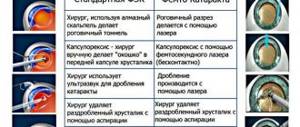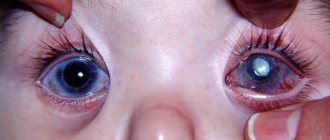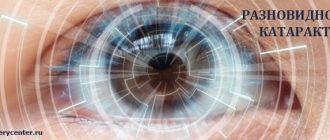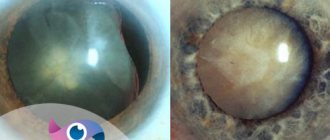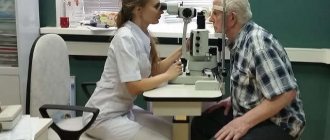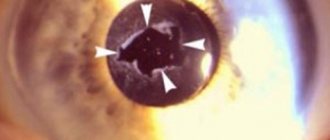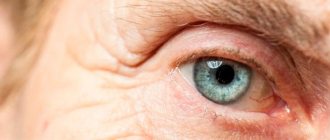08/26/2017 Senile cataracts are one of the leading causes of blindness in people around the world. Statistics show that the disease described is responsible for 51% of blindness cases worldwide. Such visual impairment can be easily restored through surgery, during which the patient's own clouded lens is removed. An artificial lens is installed in this place, providing clear vision. How to prepare mentally and how to act correctly if you face such an intervention.
Complete preoperative preparation*
Before the operation, some examinations by medical specialists and tests will be required, which can be taken both at various medical institutions (at your place of residence) and at the Excimer clinic itself in Moscow.
List of tests required for the operation:
- Clinical (general) blood test.
- Blood test for hepatitis B (HBs-Ag).
- Blood test for hepatitis C.
- Blood test for RW (syphilis).
- Blood test for HIV.
- ECG study.
It is necessary to provide original test results (test expiration date is 1 month).
*You can also undergo preoperative preparation at the Excimer clinic.
Cataract surgery - causes
This disease can affect the eye for various reasons. The main ones are:
- Eye or head injuries;
- Serious metabolic disorders (diabetes mellitus is very often the cause);
- Constant exposure to sunlight and other types of radiation on the retina;
- Age-related changes in the lens;
- Serious infectious diseases.
Due to the manifestation of one of the irritating factors on the lens of the eyeball, severe clouding is formed, which leads to complete blindness, so cataract surgery is needed.
On the day of surgery
The patient must come to the clinic at the appointed time ( with a passport, certificates of testing ), and conclude an agreement. Then it is placed at the disposal of specialists in the operating room for intervention. On the day of the operation, you need to spend about three hours in total in the clinic. This time includes preparation for the operation, anesthesiological support, the operation itself and postoperative examination.
Before surgery it is recommended:
- take a shower;
- wash your hair;
- wear clean underwear (preferably cotton);
- take sunglasses with you;
- refrain from drinking alcoholic beverages;
- do not experience increased physical activity.
There are no restrictions on food intake, but it is recommended that the last meal be taken 4 hours before surgery.
First stage
After making an accurate diagnosis, you and your doctor will discuss all the nuances, indications and the need and timing of the operation. If you cannot do without surgery, and the date of the key visit to the clinic has already been determined, you need to think about organizing your daily life during the perioperative period. Some tips:
- After replacing the lens for cataracts, you will not be able to work for some time and will be on sick leave. Discuss these nuances with your boss or employer so that there are no surprises for anyone.
- Consider who will pick you up from the clinic after the operation is completed. You can forget about driving a car yourself for a while. A taxi is also not the best option - it will be difficult to get from the car to the apartment or the door of the house without help.
- During the postoperative period, you will have one or more office visits.
- Completely abstain from alcoholic and low-alcohol drinks at least 2 days before surgery.
- The morning of surgery, take a shower and wash your hair. This will maintain a sterile environment in the operating room.
- Wear clean clothes that are easy to put on and take off. Information for the fair sex - makeup on the face and eyes is unacceptable.
- On the day of the intervention you need to be on an empty stomach.
Of course, these are not all rules, recommendations and restrictions. Each case is individual. To avoid worry, prepare a list of questions in advance to discuss all the details with your doctor.
After operation
The operation requires pupil dilation. Therefore, to ensure that the light does not cause discomfort during the first time after the intervention, it is recommended to wear sunglasses. The operated patient will be examined by the attending physician, give the necessary recommendations - and you can go home. Then, according to an individual schedule of postoperative examinations, you must come to the clinic and be observed by your attending physician.
During the first time after surgery it is recommended:
- protect your eyes from excessive strain;
- avoid sudden bending and heavy lifting;
- do not expose your eyes to sudden temperature changes;
- do not rub your operated eyes;
- try not to abuse alcohol for 2–4 weeks after surgery.
You can watch TV, read, write, eat any food.
For a faster recovery period, the attending physician will determine the order of use of eye drops and draw up a schedule for subsequent preventive examinations. Typically, patients are examined the next day after surgery, then after a week, one month, three months, and more often if necessary. It all depends on the individual characteristics of the visual system.
All recommendations regarding the recovery period will be given by the attending physician. Strict adherence to his recommendations is the key to a quick recovery.
Cataract surgery - basics
Nowadays, doctors classify several types of surgical intervention, in which it is possible to remove cataracts and completely restore vision loss:
- intracapsular extraction;
- ultrasonic removal;
- laser correction;
- extracapsular surgery.
These types of surgery remove the damaged lens from the retina of the eyeball. But the most common method in our clinic is phacoemulsification. After this procedure, the patient will need much less time to fully recover from surgery. In almost ten days, the patient who underwent such an operation can return to his usual way of life.
What questions should you ask your doctor before cataract surgery?
- What visual acuity can I expect after surgery?
Although many patients experience improved vision within the first few hours after surgery, others experience improvement within the first one to two weeks. In some cases, blurred and double vision also occurs as a normal phenomenon during the recovery period. The maximum possible vision depends, of course, on the presence of additional diseases that could not be affected by cataract surgery.
- Will the eye adapt to an artificial lens?
Artificial lenses are made from well-tolerated artificial materials (polymethyl methacrylate, silicone, acrylic), which usually do not cause rejection. Modern artificial lenses, as a rule, have a long life.
- Should I have cataract surgery?
Since cataract surgery is gentle on the patient, every day with good vision is worth it. Good vision will help you create more social contacts, allow you to not depend on the help of others, and reduce the risk of accidents.
- Cataracts - laser treatment. Can cataracts be cured with laser treatment?
Theoretically, laser treatment of cataracts is possible. But in practice on an international scale this method has not yet been worked out.
- How to understand secondary cataract?
Our preferred method of surgery involves preserving the lens capsule behind the cornea and iris, thus significantly reducing the risk of complications. However, in approximately 30% of cases, the lens capsule deteriorates slightly within 3 years. This so-called secondary cataract can impair vision in the same way as with cataracts. If you develop a secondary cataract, you can then treat it with a special laser on an outpatient basis and painlessly in a few minutes.
- Will I feel pain during and after surgery?
The operation is painless. However, as with any other surgery, some patients become sensitive to changes in the weather or experience minor post-operative pain that is so minor that it does not even need to be relieved.
- What complications occur most often?
If your lens was particularly hard, or if severe inflammation occurs, there may be a rapid swelling of the cornea, so that your vision will be clear again a few weeks after surgery.
Everyone knows what it is like to feel dots and threads before the eyes. We are talking about clouding of the vitreous humor in the eye. This has nothing to do with cataracts. However, vitreous opacities after surgery are less common than before. If there are no additional flashes before your eyes, then the clouding is in most cases harmless and the cloudy sensations will subside within a few weeks after surgery.
- What are the most serious complications?
In a small number of patients, a few months after cataract surgery, a decrease in visual acuity is detected due to retinal edema. In such a case, drug treatment will be required for several weeks.
Retinal detachment occurs extremely rarely. But if this happens, at an early stage the situation can be corrected with outpatient laser treatment; in later stages, surgery will help.
A healthy eye is always full of beneficial bacteria. If individual bacteria enter the eye during surgery, they will be destroyed by the body's own defenses. Yet in less than one case in a thousand, bacteria entering the eye can lead to serious inflammation that must be treated in hospital or sometimes with surgery. In extremely rare cases, vision loss may also occur.
Which doctor should I contact?
If a patient has cataracts, he consults an ophthalmologist. He prescribes laboratory tests, instrumental research methods, and conducts his own diagnostic tests. Before surgery, it is necessary to determine visual acuity. Most often, in a patient with cataracts it is sharply reduced. Additionally, the doctor determines the condition of the fundus, the extent of cataracts, and other complications. For example, glaucoma, retinal detachment. During cataract surgery, the doctor will be able to perform additional therapeutic procedures that will improve the condition of the eyeballs.
If any indicator deviates from the norm, an additional consultation with a cardiologist, infectious disease specialist, pulmonologist, or neurologist is scheduled. If an exacerbation of the disease, infectious and inflammatory processes in organs is detected, the operation is postponed. During the procedure, the patient's condition may worsen.
If there are no contraindications to the operation, the ophthalmologist determines the date and time.
Since general anesthesia is used during surgery, it is imperative to consult an anesthesiologist. It determines whether the patient has allergies. In some cases, it may be necessary to replace one type of anesthesia with another, since the patient may have a drug allergy.
Taking tests
A few weeks before the procedure, it is necessary to identify the condition of the internal organs and systems. For this purpose, instrumental and laboratory tests are performed:
- General blood analysis. It indicates the state of the circulatory system, the presence of hypoxia (oxygen starvation). An increased number of ESR and leukocytes means that the inflammatory process has spread in the body. If the data in the analysis is overestimated or underestimated, this is a reason for additional testing of the body and treatment before surgery.
- General urine analysis. The condition of the urinary system and kidneys is revealed. For some diseases, general anesthesia is not permitted because it affects the kidneys.
- Blood chemistry. Indicates an enzymatic composition. For example, the enzymes ALT and AST are determined, which indicate the condition of the liver tissue.
- Rh factor, blood group. The analysis is necessary if an emergency blood transfusion is needed.
- Test for hepatitis B and C, HIV infection. If an exacerbation of hepatitis is detected, treatment is carried out, only then surgery is prescribed. The doctor should be alerted to the presence of these infections in order to be especially careful. It is important to sterilize all instruments after the patient to prevent the spread of hepatitis or HIV.
- Fluorography. The condition of the pulmonary system is determined; if an inflammatory disease is detected, the operation is postponed. During its implementation, the patient's condition will worsen.
- Electrocardiography. Since the operation uses anesthesia, it may be contraindicated for people with serious cardiovascular disorders.
Based on laboratory and instrumental research methods, the doctor judges the patient’s health status. There are contraindications for which the procedure is not performed.
Cataract surgery - price
The cost of cataract surgery is fixed for each medical center. institutions. Free cataract surgery is available in public hospitals, under certain conditions.
Cataract surgery, the price of which is indicated on the clinic’s website, is performed quickly and with virtually no complications.
You can make an appointment and ask clarifying questions to our specialists by phone in Moscow (daily from 9:00 to 21:00), using the feedback form on the website.
Fomenko Natalia Ivanovna

